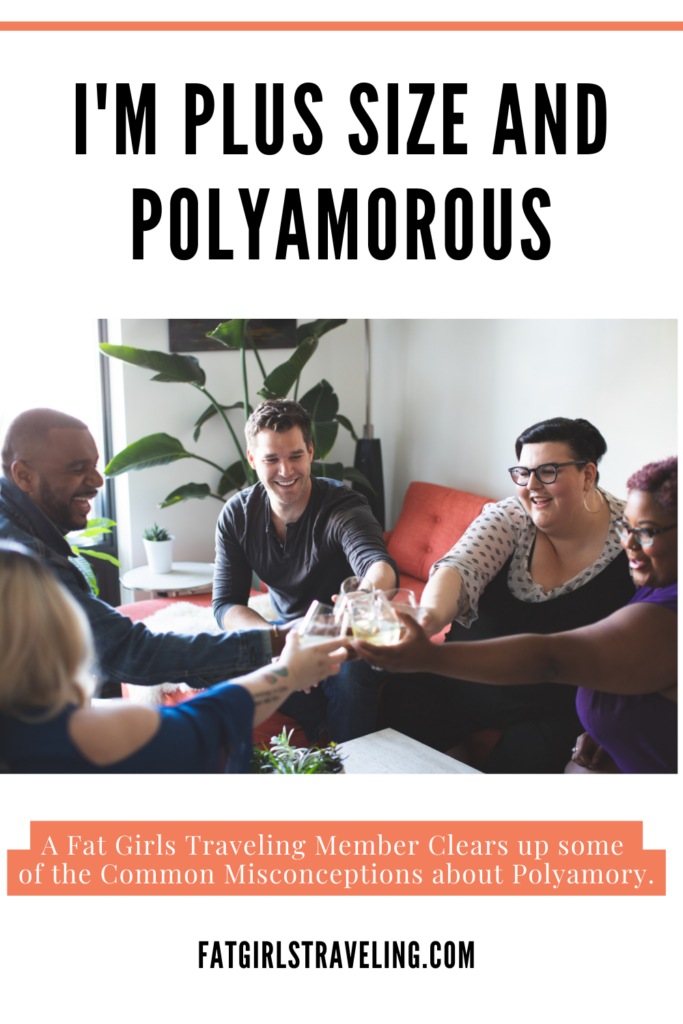We’re always asking our members about sex, love, and dating and something that’s often brought up is alternative dating styles. Quite of few of our members shared that they were polyamorous and plus size which is something we don’t discuss enough. So we asked one of our members to clear up some of the common misconceptions about polyamory.
Misconception: Polyamory is just about sex.
While there are people that enjoy being sexual and including that as an aspect of their non-monogamy it isn’t an essential part of it and, for a lot of people, it isn’t a factor at all. Polyamory for me is a way to explore and experience all of the facets of love. It allows me an opportunity to connect with people on a deeper level, removing the pressure to keep the relationship looking a certain way. Plus, who doesn’t love being in love? As a woman who experiences attraction to all genders, I love the variety I continue to experience in my dating life.
Misconception: Polyamorous people are just being selfish and don’t want to commit to one person.
I’d argue that isn’t even close to the truth for me or anyone I know. I love commitment, and I love sharing my life and time with people that I love. When you devote yourself to a person you are promising to make them a priority in whatever way you agree upon, this doesn’t change just because you are committing to more than one person.
Not every relationship you have will look the same! Sure, you could argue that having more than one partner is selfish but in a world designed to drain us of all of our energy, why not take some time for love? Partners aren’t just there for your pleasure, you’re giving as much as you are receiving in relationships (or at least you should be) and if the idea of having more than one partner is too intimidating because you don’t have enough time, that’s fine too! Polyamory isn’t for everybody, but neither is monogamy – and that’s okay!
Misconception: Polyamorous people don’t get jealous.
Jealousy absolutely exists in polyamorous spaces; we’re all human, right? Jealousy is a normal human experience… as a matter of fact, I don’t know a single non-monogamous person who doesn’t feel jealous now and then. The difference is that non-monogamous people tend to approach feelings of jealousy with openness, compassion, and curiosity rather than shame or anger. Taking this approach, even in monogamous relationships, leaves room for growth and encourages healthy communication.
What does this look like in action? Let’s say your partner is on a date with another person and you’re feeling jealous. You have to start by figuring out the root of your jealousy – is your partner not spending enough time with you? Are you worried their relationship will ruin your relationship? Are you feeling like you aren’t good enough? Once you know the underlying concern you can figure out how to address it. If your partner isn’t spending enough time with you, you can communicate that to them. If you’re insecure about something you can work through your insecurities with a therapist or ask for reassurance from your partner.

Polyamorous people are capable of experiencing romantic love for multiple people at a time so you have to ditch the idea that you aren’t enough. There is a lot that goes into maintaining a happy polyam lifestyle, and it’s so worth it to do it right.
Misconception: Polyamory is just cheating on your significant other.
This is my least favorite misconception. It seems to be quite common among folks who don’t know much about polyamory, and it couldn’t be further from the truth. Polyamory is an ethical approach to non-monogamy that encourages open communication and truthfulness in all aspects. We even have terms for your partner’s other partners – metamours, or metas, and there’s a whole style of polyamory centered around everyone sharing time together; kitchen table polyamory! The great thing about it is you get to set your own style of non-monogamy, so you get to decide what your non-monogamy looks like and choose partners that align with your wants.
Misconception: Polyamorous people are more likely to have STIs.
As we all know, having multiple sexual partners always includes a higher risk of getting an STI but in situations of open communication, you are encouraged to talk about regular testing and to tell your sexual partners about new partners. When you open the door for honest communication you are more likely to take precautions whenever necessary to protect yourself from STIs.





